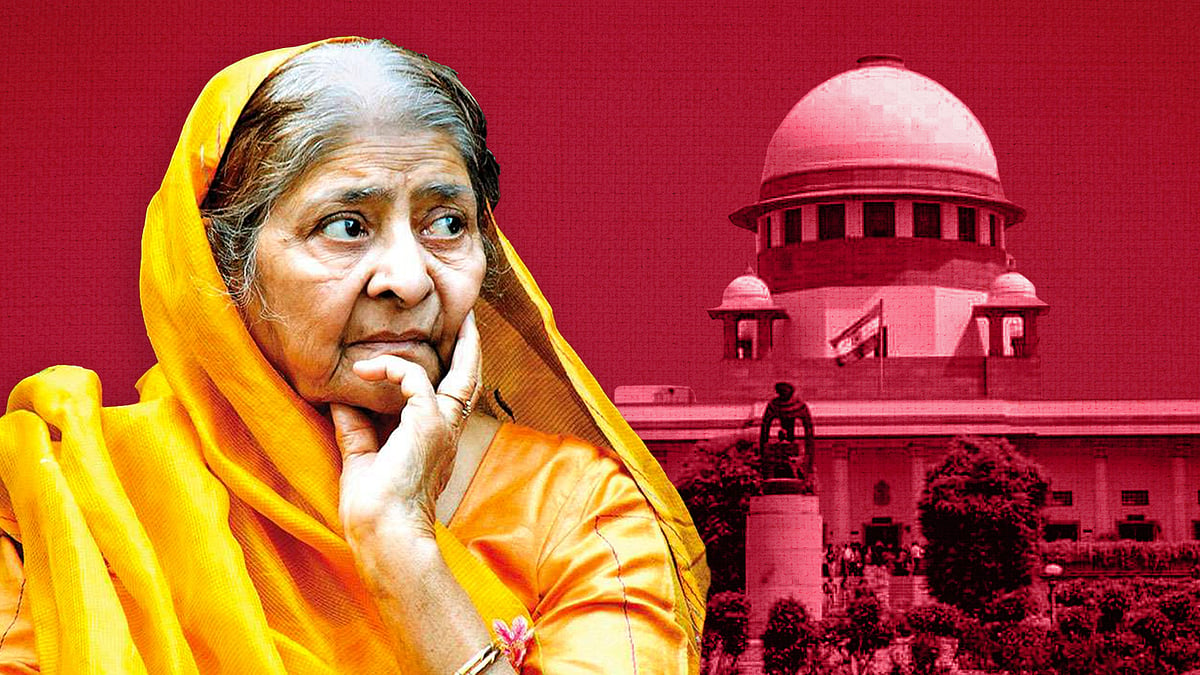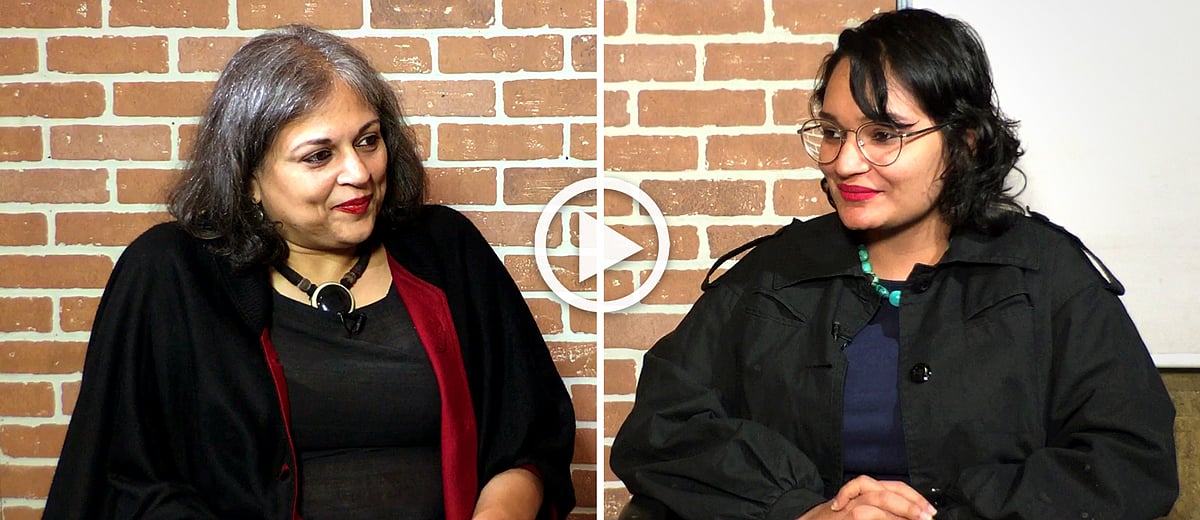From Bilkis Bano to Zakia Jafri, the media needs to ‘keep the pot boiling’
If justice systems fail, what else will keep these memories alive?
August 15, 2022 will be remembered. Not for the flag-waving or declarations made by the prime minister from the Red Fort, but for the fact that, on this day marking 75 years of India’s independence, 11 men convicted of a heinous crime were granted remission from their life sentences.
Even as the prime minister spoke of women’s safety and empowerment, his home state of Gujarat released these 11 men from Godhra sub-jail. The crime for which they were convicted is horrific, even in the retelling today. Worse still, the survivor, Bilkis Bano, is now condemned to relive it. Yet, as these men emerged from jail, they were greeted with sweets and garlands by members of the prime minister’s party, the BJP.
The Bilkis Bano case is one that should never be forgotten. Soon after dark on February 28, 2002, a five-months pregnant Bilkis, 21, and members of her family left their village of Randhikpur in Dahod district. They hid in fields, hoping to escape mobs that had descended on the village following the Godhra train burning the previous day.
But they could not escape. On March 3, a group of 20 to 30 men carrying swords and sickles assaulted them. They raped Bilkis, her mother, and three other women; and killed her three-year-old daughter Saleha and most of the others in the group of 17. Only three, including Bilkis, survived.
The fact that we remember this case is because it is emblematic of the horrific communal violence that took place in Gujarat, where Muslim women were the targets of the most repulsive acts of sexual violence and assault.
We remember it, but not because the media continued to report it. Some journalists did persist but after 2019, when the Supreme Court asked the Gujarat government to pay Rs 50 lakh compensation to Bilkis, the media lost interest. The only reason it is still remembered is because of this woman’s singular courage and determination to continue her fight for justice with support from civil society organisations.
For the media, the Bilkis case holds out several lessons.
We remember it, but not because the media continued to report it. The only reason it is still remembered is because of this woman’s singular courage and determination to continue her fight for justice with support from civil society organisations.
We have to remember that today, there is an entire generation that has grown up since the Gujarat communal carnage of 2002. They would not have known about Bilkis or the other atrocities during that period. Thus, the significance of this particular case, and the context in which it took place, bears repeating.
If this story had been left to television channels, we would have heard a lot of noise but very little by way of factual background or context. Barring exceptions like NDTV, mainstream TV did not give the recent release of the convicts the attention it deserves. As a result, the significance of what has happened in the context of today’s communal politics, and the historical details that are essential to understand this, would have been lost to most consumers of mainstream media.
Fortunately, the print media in India is not yet extinct and hopefully will continue to survive. Mainstream newspapers, or at least the English papers I looked at, did provide explanatory stories to fill in details that many would either not have known or forgotten. It is interesting that so many mainstream newspapers are now doing explanatory journalism – it seems that there is a demand for this that is unfulfilled by reporting and commentary.
More importantly, newspapers also reported not just what Bilkis and her husband Yakub Rasool felt, but also the response of now retired Bombay High Court judge UD Salvi, who gave the original ruling in 2008 against these men. Justice Salvi also spoke to several television channels and independent YouTube channels, like Barkha Dutt’s Mojo Story. He was clear and unequivocal in all these interviews, stating as he does in this report in Indian Express, that “if it is being said that they are innocent, they did not commit the crimes and hence they are being honoured, it is defaming the judiciary which gave the judgments convicting them”.
There were also disturbing follow-up stories that need to be noted for the record. For instance, Indian Express reported on how the released convicts had been out on parole several times while serving their sentences. Several people living in Randhikpur, who had testified in the Bilkis case, had filed police complaints of being harassed and intimidated by these men during those periods when they were out on parole.
...if it is being said that they are innocent, they did not commit the crimes and hence they are being honoured, it is defaming the judiciary which gave the judgments convicting them.
Justice UD Salvi to the Indian Express
Even more disturbing is this Indian Express report about Muslim families leaving Randhikpur and seeking shelter in a relief camp in Devgarh Baria, where Bilkis Bano and her family have been living since 2017. One of the women arriving at the camp said, “None of us has the kind of courage that Bilkis has shown in the past two decades to fight. On our way here, we came across a huge convoy of the ruling party near Kesharpura and were petrified. I held on to my daughter tight.”
Clearly, this is a story that has not yet ended, not just in terms of legal challenges to the release of the convicts but also the renewed fear in Muslims in a state that is heading for an election. For them, the memories of 2002 have not faded.
Surveys have suggested that editorials in newspapers are not widely read. Yet they are important as a record of the stand a newspaper takes on a particular issue. In this instance, both Indian Express and the Hindu carried strong editorials on the release of the convicts and their subsequent felicitation by members of the BJP and its affiliate organisations. The editorial in the Hindu concluded: “With an Assembly election due in Gujarat at the end of the year, it is difficult not to read political significance into this decision. The sight of the released convicts being greeted and feted on their release will not sit easy on the country’s conscience.”
The other lesson for the media is the importance of memory, of reporters recalling what they reported. For instance, one of those who diligently covered Bilkis Bano’s case, when it was shifted at the behest of the Supreme Court from Gujarat to Maharashtra, is senior journalist Jyoti Punwani. She was able to remind us that the attitude towards these 11 convicts even in 2008, when they were sentenced to life imprisonment, was no different to what it is today. She writes in the Deccan Herald:
“It's not the first time these men, who gang-raped women and killed 14 innocents, including Bilkis Bano’s infant daughter, are being honoured. The day they were sentenced to life in Mumbai in 2008, this reporter saw people touch their feet in the trial court. The courtroom was packed with villagers from Randhikpur, the mood overwhelmingly sympathetic to the guilty. Snide remarks were made against the alleged ‘bounty’ given to Bilkis (there was none). Even others present in court for unrelated matters muttered that shifting the case from Gujarat to Mumbai was a ‘conspiracy against Hindus’. One of those sentenced even declared that he’d done what he had ‘for God’, and that it was ‘a crime in Hindustan’ to belong to the Vishva Hindu Parishad.”
The Supreme Court, in its judgement in the Zakia Jafri case challenging the findings of a special investigative team into the attack on Gulberg Society in which Jafri’s husband was killed, used the phrase “keeping the pot boiling” while referring to those who helped Jafri. As we now know, that particular ruling resulted in human rights activist Teesta Setalvad and former senior police officer RB Sreekumar being taken into judicial custody. Their bail hearing is before the Supreme Court.
I would argue that it is the job of the media to “keep the pot boiling” on issues like the communal carnage in Gujarat in 2002, the continuing attacks on Dalits and minorities in many parts of the country, the human rights violations in Kashmir and the Northeast, and much more. If the media does not do this kind of follow-up, the memory of these atrocities will fade and ultimately disappear, especially when the justice system also often fails.
 ‘Communal violence is like lava erupting from a volcano’: Kapil Sibal in Zakia Jafri hearing
‘Communal violence is like lava erupting from a volcano’: Kapil Sibal in Zakia Jafri hearing Revati Laul on Gujarat riots and The Anatomy of Hate
Revati Laul on Gujarat riots and The Anatomy of Hate